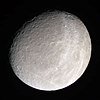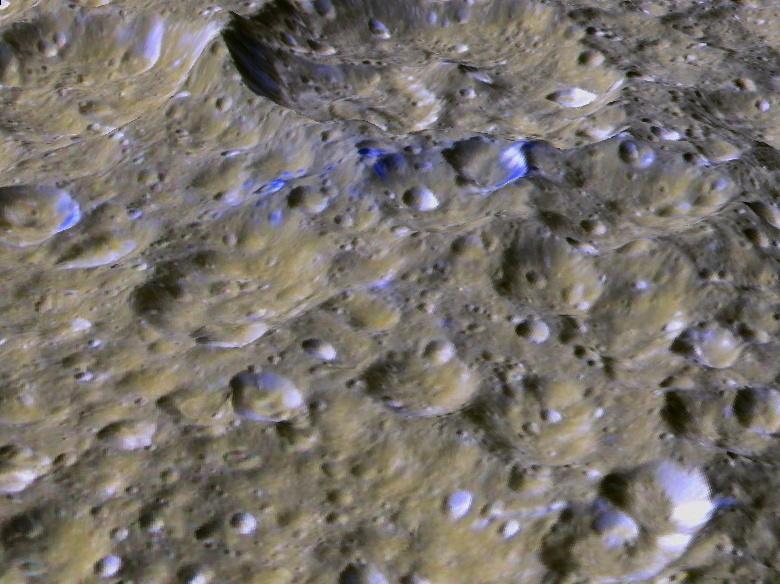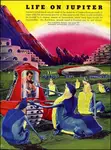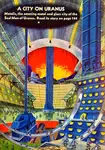what to see on
rhea
r0ckscape on rhea

They donned their spacesuits, hurried through the air lock, and swung down the ladder to the rocky surface below. The view was not encouraging. They appeared to be near the center of a vast crater, similar in structure to one of the giant walled plains on the moon, such as Theophilus or Ptolemaeus. Line many of the lunar craters, too, there was an irregular peak at the center which towered almost to the level of the surrounding wall.
“Wonder whatever caused Dearborn to select this spot for his camp?” Dale said, surveying the bleak landscape.
“Doubtless he had his reasons,” Fleming murmured. “Are you sure this is it?”
“Must be,” said Dale. “Everything checks. There are the three craterlets in a row with the long crack running along beside them. Although I don’t see any signs of the camp itself.”
“The most likely spot would be in one of these caves at the base of the central peak,” Fleming suggested. “Suppose we wander over in that direction and take a look around.”
They began picking their way over the pulverized rock that littered the crater floor. The debris was of a uniform brownish tint, appearing to have undergone extensive chemical action.
"The closer we get to Saturn the less I like it," Fleming said, gazing with troubled eyes at the giant globe looming on the horizon ahead of them. The planet appeared suspended in space above the crater rim like a swollen Easter egg that had been badly streaked and mottled in the dyeing bath...
Philip Latham, Missing Men of Saturn (1953)
>> Guess The World - Third Series
descent through the clouds of rhea
At length the billowing clouds which covered the surface of Vilos could be distinguished. Kneeling at a floor port, Derek watched as the sphere flattened out and reversed curvature. Now it was an enormous bowl of fluffy gray and white vapors. A moment later it was flat, and directly underneath. Derek glimpsed a huge metallic globe drifting just above the clouds not far away; then everything was blotted out by the grayness which enveloped them.
Underneath the clouds was the central palace of Kora. Derek's memory stirred vigorously. Vividly from his submerged consciousness came a picture of frenzied mobs in the plaza, of bloodied marble steps and of a boy who fled screaming from the scene. Deep hatred rose up in him and a cry escaped his lips: "Murderer! Killer!" Then he inhaled deeply of the pink gas and forgot. He smiled up into the narrowed eyes of the pilot.
"Your home," said Chandor. "Remember it?"
Derek shook his head. Things of amazing interest were below. A flood of questions left his lips. Chuckling, the pilot answered them.
Dazzled by the brilliant light from the city, Derek listened. He would find the lighting moderate after they had landed, Chandor told him. Up here it was intense because they directed it against the low clouds for better diffusion below. Artificial illumination was used in Vilos because of the cutting off of the already distance-weakened sunlight by the perpetually hovering vapors.
Kora, a city of twenty million souls, was on the island of the same name, the largest island of the planet. There were no great continents, only the islands, and a vast sea that covered all but one-twentieth of the surface. Derek glimpsed the milky waters of the ocean and remarked that steam was rising from them. "True," agreed Chandor. "The sea is the source of our clouds; its waters are always hot."
Even in the state induced by the pink gas, Derek could reason.
"But the sun is so far away," he objected.
Chandor enlightened him. "We don't depend on the sun but upon Saturn, whose rings radiate tremendous electronic energy. The core of Vilos, of nickel-iron, is heated by these radiations from the mother planet. Through chasms in the sea bottom core and steam is generated, heating the mass of water and bringing warmth to our atmosphere. The steam is also piped to our cities and used for generating electric power."
The tallest spires of Kora were now on a level with the space ship. Directly below them were the broad plazas of the palace area. They nosed down into the central court. A single short rocket blast, a gentle bump, and they had landed...
Harl Vincent, Prince Deru Returns (Amazing Stories, December 1938)
>> Guess The World - Third Series
the bewildering biosphere of rhea
Rhea depended for
its life upon retaining an atmosphere by means other than the gravity of mass.
Right from its inception the bio-field must have depended upon complexity as an
actual force: the “pull” of a life-system so varied that it brought hitherto unknown
laws into play; laws which could never be discovered outside its unique zone…
The complexity of the most colourful coral reef on Earth was as nothing
compared to the variety found on Rhea, where almost every organism was its own
subspecies. Only the highest forms, the intelligent forms, were stabilized to
any marked extent; and even then, races varied outrageously – some had two
sexes, some three, some a larger number… and some (like Ghilidb’s) were sexless
and instead had 'grall', which meant that individuals could only digest their
food with the help of someone of the opposite 'grall'… The capabilities of
individuals varied just as drastically, some being as keen-sighted as eagles,
others as keen-nosed as dogs, and others telepathic. As for the lower forms,
the “ordinary” animals, they presented such apparent chaos as to drive a Terran
biologist insane. Yet it was this “chaos” that generated the force that kept
Rhea alive. The complexity-force, the gravitation of variety, somehow fenced
the air-molecules into the bio-field, and, closer to ground, pulled at Hurst’s
boot-soles as if he were shod with magnets on a metal path.
This made all the difference to the
way he moved; it allowed him a grounded stride instead of the extravagant
soaring hops he would otherwise have made; it gave him, in short, a proper
world to live on. Admittedly the visual effect, especially when one looked at a
crowd, was eerily reminiscent of the motion of seaweed wafting in a current,
rather than of “proper” gravity, for solid bodies were “weighted” only within
an inch or two of the satellite’s surface…
Robert Gibson, The Arc of Iapetus
(J M Greer and Zendexor, eds., Vintage Worlds 3 (2020)
>> Guess The World - Third Series
ghostly blue forests on rhea

Astronomy Now report on the Cassini mission, Saturn: Exploring the Ringed Planet, p122
>> Guess The World - Third Series
Note from Zendexor: The scientists at JPL doing the image processing are, in my "ghostly blue forests" interpretation, unwitting channels of a seepage from the OSS continuum...
cat-eyed folk of rhea
Mart turned and caught sight of Emmot and Walbrook sitting a
little distance off, looking behind them in blank astonishment. Mart turned
again and winced as his head swam.
“Say, what — what the — ?" he began blankly, and Eda cut in quickly:
“They’ve been waiting for you to recover,” she explained anxiously. “They talk—
talk English!"
“Th-the devil they do!" he stammered back, and stared in amazement at a
group of twenty men and women, all of them but scantily attired, practically
Earthly in general development save that the lesser gravity had given them
shorter stature and more highly efficient biceps. All the men were white
bearded.
Their faces were strikingly childlike and docile, differing but little from
good tempered Earth boys and girls of some ten years of age. The only oddity
lay in the slit, catlike pupils of their innocent misty blue eyes — pupils
which visibly dilated and contracted under the changing lights of Saturn and
the various moons.
Beyond them there stood a rather makeshift city of dried mud; yet remarkably
enough it looked as though it was meant to resemble modem New York — a
miniature version of it in mud flung here amidst the wilds of Rhea. There
were recognizable edifices, even streets, but there was a complete lack of
unity and careful planning.
Behind it was again the evidence of that enigmatic, multi-colored aurora, while
to the right, lifting to a height of some 800 feet, and smoking sullenly, stood
a squat but none-the-less deadly volcano. . . .
Dennis Clive [John Russell Fearn], Valley of Pretenders (Science Fiction, March 1939)
>> Guess The World - Fifth Series
Comment from Zendexor: A reversal of the usual view that it's high gravity that breeds folk of low stature while low gravity makes for tall spindly inhabitants!





































